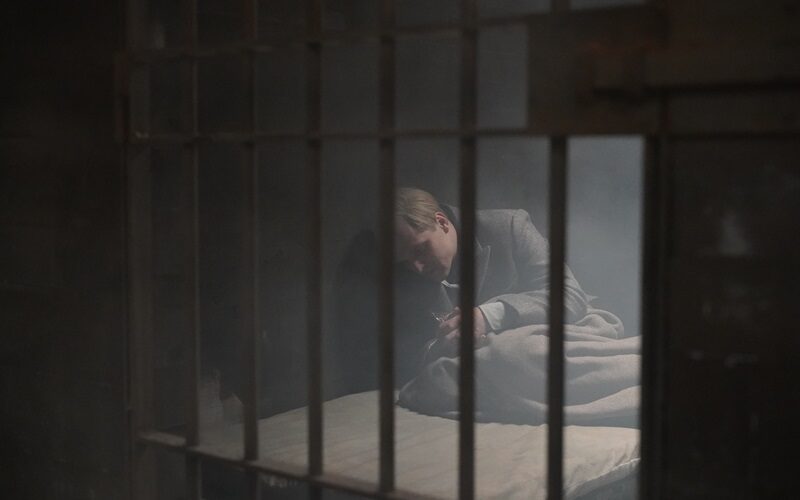Bonhoeffer: Pastor. Spy. Assassin. (Komarnicki, 2024)
My favorite scene in Bonhoeffer (I will forgo the cumbersome subtitle for the body of this review) comes early on when Dietrich’s brother has gone to war and their mother gives him the present of his sibling’s Bible. “He said he underlined the best parts for you,” she intones solemnly. We see the lad leafing through the volume, with more stuff underlined than not.
This scene isn’t particularly dramatic nor important plot-wise, but it does exhibit the sort of ambiguity seldom found in movies this devout. Is the underlined Bible an easy symbol of how devout the family is — look how much they read the Bible! — or a reminder that we all receive God’s word as mediated through someone else…at least to start?
Later, when Dietrich enters a jail cell, someone has written on the wall that in 100 years this will all be over. This scene, too, fails to land as hard as it could because it is unclear whether we are meant to take it literally or ironically. The most simple read is that those in the dark moment were encouraged by taking a cosmic perspective. (How often in the last eight years have I quoted MLK’s maxim that the long arc of history bends towards justice.) A less sanguine reading of that scene is that we, the audience of the film, are eighty years into that 100-year prophecy and know well that the fight against fascism and totalitarianism is not yet in the past, much less the distant past.
Were I confident that writer/director Todd Komarnicki was being deliberately subtle in these and other scenes, I would have esteemed Bonhoeffer more than I did. Alas, the line between subtlety and unintentional ambiguity is a hard one to demarcate. That it is even possible to consider a more ambiguous interpretation is rare in a contemporary movie for and about Christians, where direction and star power is too often used to hide the weakness of the writing.
Komarnicki’s writing here is … better than I expected. I’m not sure that’s it’s where it needs to be for material this challenging. It is hard to make films about saints and prophets. The lives of saints are often an indictment as much as an inspiration, and prophets are often the vehicles for unpopular truths. Entertainment movies, to paraphrase David Mamet, pander to the audience, try to make the audience feel good. The feel-good part of Bonhoeffer’s legacy is that we love to be reminded (but only after the fact) of Christians who were on the right side of history. But the challenging part of that legacy is the reminder of how singular that resistance is and how few people today seem interested in following his example rather than just lauding it.
I don’t know why there has never been a great Bonhoeffer biopic, why films like A Hidden Life and Sophie Scholl: The Final Days have a greater emotional impact even though their subjects are less well known. Perhaps is is because their subjects are less well known, making their choices and sacrifices seem like those of ordinary people. Dietrich Bonhoeffer was, of course, a real person too. I don’t mean to suggest otherwise. I just never got the sense in this film that Dietrich wasn’t always carrying the weight of his own legend around with him.
The film has received some negative publicity due to claims that it has been appropriated by “Christian Nationalists.” I didn’t interpret the film that way. If anything, the more obvious historical parallel would be that Christian Nationalists in power abuse the gospel and people like Bonhoeffer should oppose them. But the whole “Assassin” part of the subtitle speaks to the disquiet that his story causes when not left safely in the distant past. Christians who oppose Christian Nationalism have always been more comfortable with rhetorical rather than political or militant resistance.
So is the movie any good? I guess so. It’s better than most movies aimed at and marketed to Christians in that it at least allows for some nuance in thinking about its ideas even if it doesn’t invite that nuance often enough or require it of those who just want to see their own ideological reflection in a hero’s portrayal.

